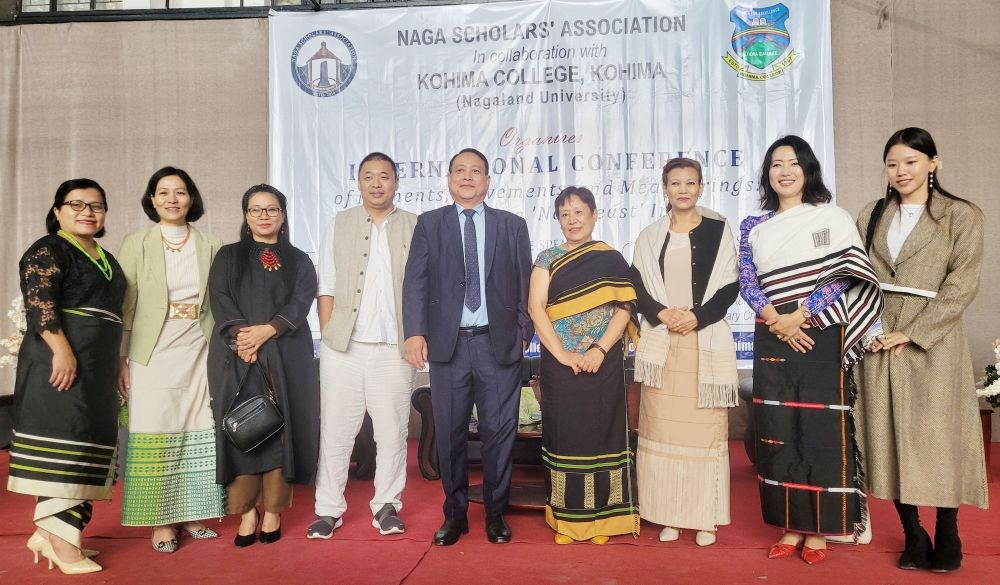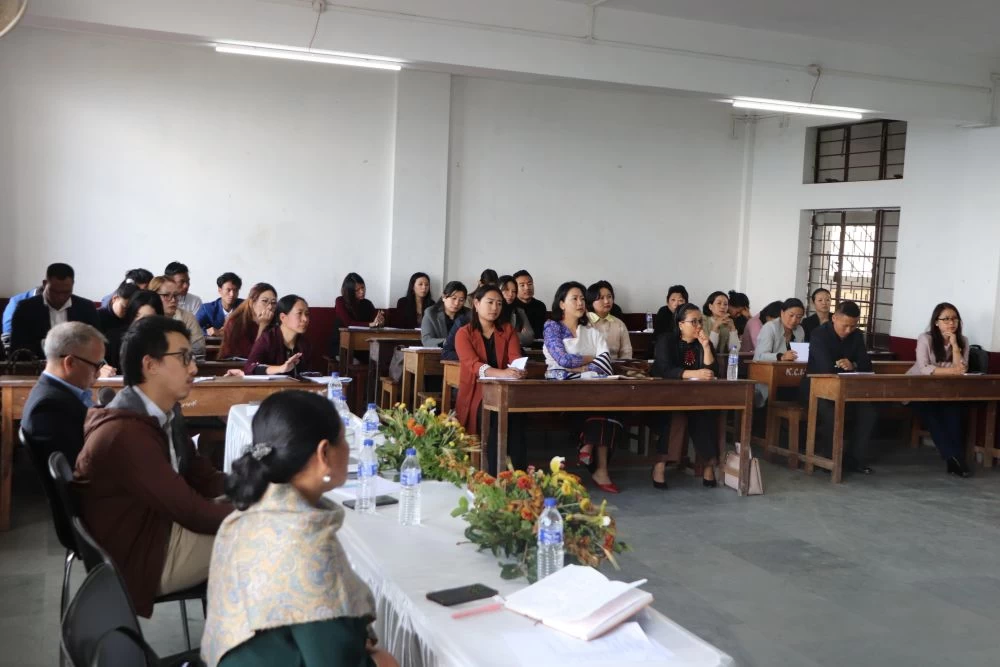Dignitaries during inaugural function of international conference in Kohima on October 27. (Morung Photo)

Our Correspondent
Kohima | October 27
A two-day International conference of moments, movements, meanderings: Re-examining “Northeast India” under the aegis of Naga Scholars’ Association in collaboration with Kohima College commenced at the college today.
Welcoming the scholars and intellectuals to the conference, Kohima College Principal, Dr Vitsosie Viiprii extended best wishes to everyone present and hoped that the conference will be fruitful and everyone will learn from one another.
Dr AC Kharingpam, Advisor, Conference Organizing Committee & Assistant Professor, Department of English, Jamia Millia Islamia, New Delhi conveyed that Prof Mohd Asaduddin, Advisor to Vice-Chancellor Academics & Research and Professor of English, Jamia Millia Islamia, New Delhi could not join the conference on health ground. Prof Asaduddin was supposed to interact with Chief Minister of Nagaland to propose a Centre for Translation for Nagaland, he said.

The inaugural function was chaired by Lily Angami, Associate Professor & Head, Department of Economics, Kohima College. Vote of thanks was proposed by Zeneinuo Solo, Associate Professor & Head, Department of Political Science, Kohima College.
The conference, to continue till October 28, will be marked by plenary session on different themes “Spatiality, territories and landscape, Death, dying, philosophical and religious worldviews, Identity, articulations, tribe and indigeneity, Literary narratives, Language studies, Media studies, arts, performance and aesthetics, Gender and sexuality, Trauma, loss and memory, Militarisation, violence and state-being, Cities, migration, labour and socio-economic development and Class, Capital and Infrastructure.”
Meanwhile, Dr Kevileno Sakhrie, Retd Associate Professor, Department of English, Kohima College will be the valedictory speaker at valedictory programme on October 28 at 3:00 pm.

Writings from India’s Northeast: A contemporary view
Dr Theyiesinuo Keditsu, co-convenor, Conference Organizing Committee & Assistant Professor, Department of English, Kohima College read out the keynote address of Prof Mohd Asaduddin as the later could not make to the inaugural session. Prof Asaduddin stated that any conference or book or article on India’s Northeast begins with a preamble that highlights its immense diversity and the inability of an umbrella term, however capacious and inclusive, to encompass that diversity.
Writers and literary historians from the Northeast have often defined literatures produced in this space in opposition to what they perceive as mainland Indian literature and separate from Indian literature, he stated.
“They claim that the Northeast has always been treated as a subaltern, less of caste or class and more of geographical margin and literary periphery. A binary was and is established in which mainland Indian literature, which itself is an amorphous and uncertain category, is seen as the centre and literatures produced in the Northeast as the periphery,” he stated
Calcutta was the educational hub for the first generation of intellectuals and writers from the Northeast where they were exposed to western ideas and modernism, he stated
There are multiple histories and multiple traditions, multiple legacies and multiple belongings.
The literary and cultural histories are enmeshed and intertwined with one another. When such a diverse body of writings is sought to be studied in a certain structured format under the umbrella of ‘Writings from the Northeast’, sought to be translated and transmitted and ‘packaged’ in a coherent way to project a certain image or realities in the Northeast, the challenges are enormous, he stated.
Such challenges should be met in an inventive and imaginative way, taking care of the complex histories and sensitivities that are involved.
“We are at a historical juncture when there is openness and curiosity about literatures from the Northeast. English and MIL departments throughout the country have expanded their canons to embrace writings from the Northeast. Publishers are more ready than ever before to publish literatures from the Northeast. I would assert that both the politics and economics, along with the trend in the academia at this moment are conducive to the growth and dissemination of this body of literature,” he stated.
He said that the many and diverse communities inhabiting the hills Northeast India possess vast and rich treasures of oral history, myth and folklore.
In the recent years, one can see a paradigm shift in writings from the North-East. The stereotype of a strife-torn and conflict-ridden society dishing out tales of violence and gore has given way to a recuperative effort to search for roots and reclaiming of past history and traditions, he stated.




